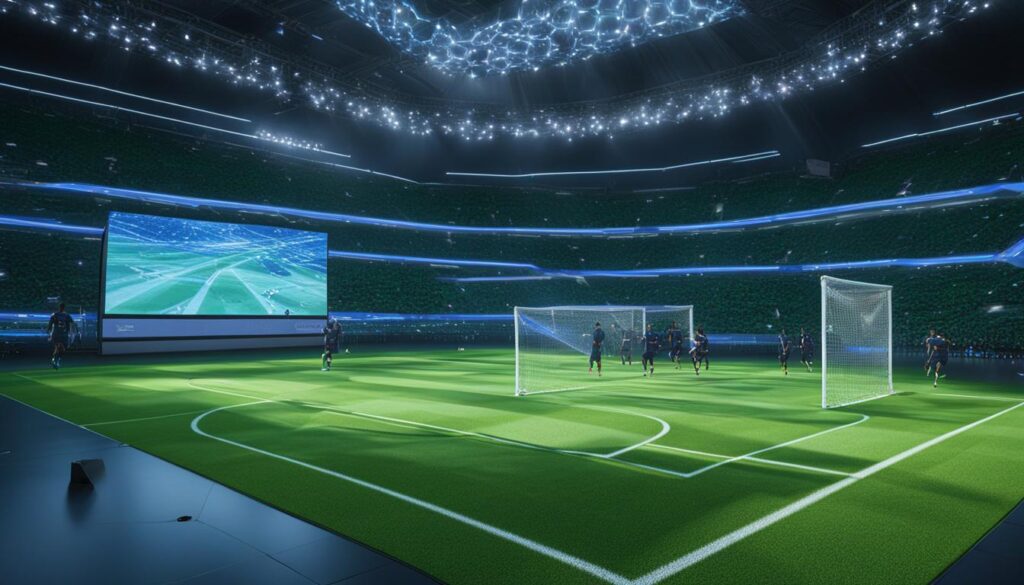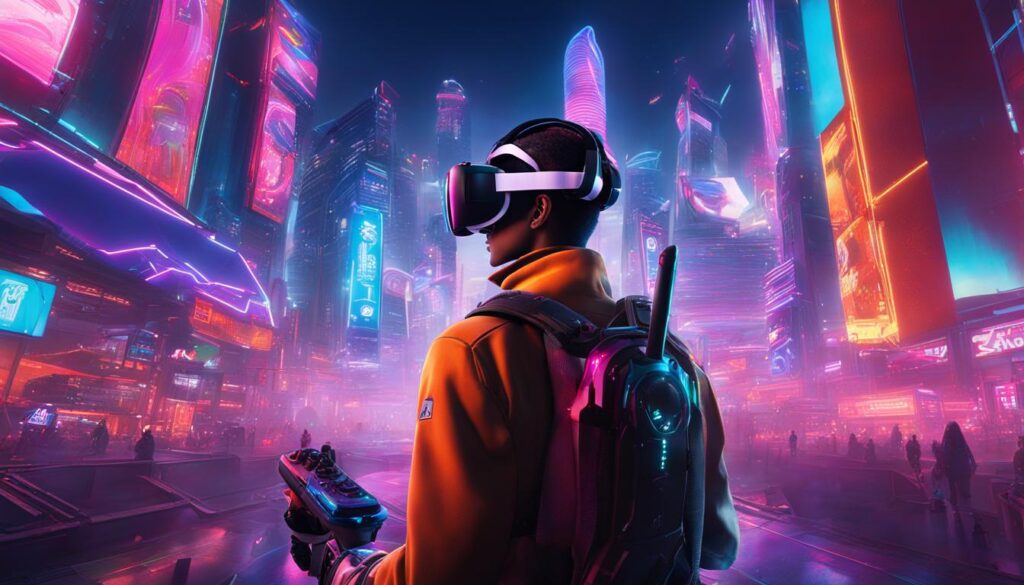The arena of video games is experiencing an exhilarating transformation, all thanks to the ever-evolving artificial intelligence gaming technology. The AI in gaming serves as the pulse for creating immersive gameplay experiences that are mesmerizingly realistic. As these digital landscapes become more intricate, the line between virtual escapades and real life begins to blur, teasing the infinite possibilities inherent in video game realism.
Indeed, the nuanced characters and unpredictable gaming environments owe their dynamism to the sophistication of AI. From outsmarting an adept AI opponent to navigating through seemingly sentient worlds, players now relish in a caliber of interactivity that was once the stuff of science fiction. The implementation of this technology invites you to step into your favorite games and experience a reality that is continually reshaped by artificial intelligence.
Understanding AI in Video Games
The integration of artificial intelligence (AI) in the gaming industry has carved a new pathway for AI game integration, bringing forth an era where video game AI techniques stand as pillars of innovation. Gamers are now witnessing a transformation, as AI in gaming enhances the virtual escapades with opponents who can think, learn, and react.
AI responsive gameplay has turned the tables on conventional gaming mechanics, inviting players into worlds where non-player characters (NPCs) are not just scripted entities but dynamic participants in the storytelling process. These AI-driven characters exhibit behaviors and decision-making prowess that parallel the complexities of real-life interactions.
“AI is not just a tool but a craftsman, shaping experiences that push the boundaries of gaming realism.”
- Enhanced decision-making patterns leading to more lifelike NPC behaviors.
- Adaptive in-game challenges that scale with player skill level.
- Dynamic environments fostered by AI’s capability to mold the game world in response to player actions.
Through AI’s impression on gaming, we’re not just playing a game; we are engaging in a dialogue with an evolving story that learns and grows with every interaction. The anticipated goal of AI is no longer a distant dream but a present-day digital reality enhancing every joystick movement and keystroke.
The Evolution and Impact of AI on Gaming
The trajectory of AI gaming evolution is studded with milestones that have dramatically reshaped the landscape of video games. Major strides in game development innovation have broadened horizons, pushing the envelope of what is possible in digital realms. As we delve deeper into the profound impact of AI on video games, we witness the bourgeoning of immersive technologies like AR, VR, and Mixed Reality.
Enabling the generation of expansive, unpredictable gaming environments with a level of variety previously unfathomable, AI’s application in procedural content creation has been revolutionary. Not only does this benefit the aesthetic diversity of virtual worlds, but it profoundly cuts down on development resources and time, a testament to the influential role of artificial intelligence in modern game creation.
With AI, the concept of balance in multiplayer games has evolved beyond static fairness to dynamic equilibrium, ensuring competitive integrity and enhancing the user experience.
But the influence of AI extends beyond the screen. It is now deeply integrated into the strategic fabric of game development, offering rich analytics derived from player interactions. This data informs improvements, shapes monetization strategies, and personalizes the gaming experience to an unprecedented degree.
- Improving game balance and difficulty scaling
- Enriching player engagement through data-driven insights
- Reducing time and costs associated with content creation
In summary, the AI gaming evolution is not just changing the way games are made but revolutionizing how they are experienced by players across the globe.
AI in Gameplay: Creating More Adaptive Experiences
As the gaming industry continues to innovate, the integration of artificial intelligence is creating nuanced environments that react to player behavior. The result is an enthralling blend of adaptive gameplay and AI game challenges that adjust in complexity and strategy. These advancements are not only keeping games fresh and engaging but are also setting a new standard for how interactive entertainment can evolve in real-time.
Adaptive Difficulty for Enhanced Challenge
One of the keys to maintaining a player’s interest is the balance between challenge and skill. Video game series such as FIFA have pioneered this through their dynamic difficulty adjustment, where the game’s AI monitors player performance and adjusts the difficulty accordingly. This ensures that players are consistently experiencing an appropriate level of challenge that matches their skill level, fostering an engaging gaming environment that adapts to individual play styles.
Dynamic Non-Player Character Behaviors
NPC AI algorithms and behavior trees are at the heart of creating realistic game characters. These sophisticated systems parse countless data points to generate contextually appropriate non-player behaviors. Whether it’s a friendly NPC reacting to the player’s actions or an enemy adjusting their tactics, the robust AI-driven behaviors contribute significantly to the narrative and immersion of modern video games.
Real-Time Strategy and Tactical Adjustments
Gone are the days when non-player characters were predictable. With the advent of real-time AI gaming strategy and AI tactical adjustments, NPCs can now learn and respond to players’ actions. Dynamic AI allows NPCs to make in-game AI learning possible, creating a more challenging and unpredictable gameplay experience as NPCs make immediate strategy adjustments to the player’s movements and decisions.
Character and Story Development Driven by AI
In the realm of character and story development, the gaming industry has witnessed a revolutionary change with the advent of AI-driven character development. Games today are not merely offering players a chance to immerse themselves in fantastic worlds, but are also providing deep narrative experiences shaped by AI in game narratives. Central to this transformation is the idea of character personality systems, which are designed to craft complex characters with behavioral patterns that react and evolve in response to the game’s storyline and the player’s actions.
One such example where this innovation visibly flourishes is in the acclaimed EA Sports’ FIFA series. A testament to this is their innovative Player Personality System. This sophisticated use of AI technology ensures that each virtual athlete is instilled with distinct qualities, from strategic prowess to on-the-pitch flair, closely mirroring the intricacies found in the playing styles of their real-life counterparts.
This layer of detail and authenticity doesn’t just affect the mechanics of gameplay; it also weaves itself into the very fabric of the game’s narrative. In modes like FIFA Manager and Career Mode, players are not just managing teams; they’re crafting stories, rivalries, and legacies.
The addition of complex AI-driven character development makes the journey within a game feel personal and dynamic. Characters are no longer static entities – they exhibit personalities that can change the course of the game’s story. The zeitgeist of modern gaming now hinges on these immersive experiences, where AI empowers characters to be more than just figures in a digital landscape; they become protagonists in their own right, with backstories and ambitions influenced by the player’s choices.
- Characters display emotional ranges and can form relationships with one another.
- AI-driven narratives create scenarios where players must make tough decisions that influence character development.
- Innovative storytelling is driven by NPCs who remember player actions and respond accordingly in future encounters.
To conclude, gaming narratives and character development are reaching new heights, thanks to AI. The vibrant, multi-layered tapestry of gaming universes is continuously expanded by AI’s capabilities, inspiring developers and captivating players alike.
Behind the Scenes: AI in Game Design and Testing
The ever-evolving landscape of video game development continuously harnesses the power of AI content generation and AI-powered game design to propel the medium to unprecedented frontiers. In this pursuit, developers leverage various AI-driven tools and processes that significantly amplify efficiency and ingenuity, reshaping the typical content creation and quality assurance models in the industry.
Procedural Content Generation and Infinite Gameplay
In the realm of procedural generation gaming, AI acts as the master architect, designing endless worlds and experiences. By algorithmically crafting complex environments and game elements, players encounter something new with each foray into the digital landscape. This not only ensures a fresh gaming experience every time but also highlights the shift towards a more personalized and engaging gameplay that AI endeavors to offer.
Automating Game Testing and Debugging
When it comes to AI game testing, automated debugging stands out as a powerhouse of QA efficiency. AI-driven test systems scrutinize countless gaming scenarios, uncovering glitches with astonishing speed and accuracy. This automated vigilance irons out the kinks, streamlining the road to a polished gaming experience that meets the high standards demanded by players and developers alike.
AI-Assisted Creative Concept Design
Generative AI in gaming is no longer science fiction but a vivid reality exemplified by the likes of Blizzard Entertainment’s Blizzard Diffusion and its contribution to automated concept design. Layering AI’s creative prowess over the depths of Blizzard’s rich game universes, this innovative tool sows the seeds for groundbreaking art, narrative, and design, further symbolizing the AI revolution in game development.
Revolutionizing Sports Games with Advanced AI
The realm of sports video games has been transformed with the infusion of AI in sports simulation, elevating the digital representation of our favorite athletic pastimes to new heights of realism and dynamism. At the forefront of this transformation is the iconic FIFA series, which, through machine learning in FIFA, has set a new standard in how we engage and interact with sports simulations. The implementation of sophisticated AI touches every facet of the game, from the grass on the field to the strategies employed by virtual players.

In FIFA’s virtual stadiums, machine learning algorithms are not just a behind-the-scenes feature; they’re an essential part of the gameplay that fans can sense and see. Game developers have unleashed the power of AI to create more than just a game – they’ve crafted an immersive, ever-changing sports adventure. Below are some of the key ways AI is reshaping the digital sports field:
- AI-driven player behavior that mirrors the unpredictability and finesse of real-world athletes.
- Dynamic weather systems and real-time injury scenarios that challenge players to adapt their strategies.
- Machine learning that personalizes the gaming experience by adjusting to individual play styles.
This advanced use of technology creates a responsive gaming environment where each match is as unique as the last, exemplifying the enriching qualities that AI brings to sports video games. Now, let’s dive deeper into these features and explore how they shape the immersive world of sports gaming.
“With AI-driven enhancements, sports simulations are no longer just a reflection of the sport, but an extension of the live experience itself.”
It’s not just about the players on the pitch; it’s about the whole ecosystem. AI in FIFA doesn’t only learn and evolve according to the user’s gameplay but also simulates the complex interplay of sports scenarios that fans cherish. This signifies a new era for sports video games, where the virtual and the real blur into one compelling narrative propelled by the sophistication of machine learning.
We’ve witnessed a drastic evolution from the days of static gameplay to a future where every virtual pass and goal comes charged with the anticipation and joy of real-life sports. The use of AI in sports simulation is more than just a technical achievement; it’s a digitized homage to the spirit of sports itself.
How AI Powers Your Favorite Video Games
When it comes to advancing the realm of sports simulations, FIFA’s AI technology is in a league of its own. With every iteration, EA Sports pushes the boundaries, simulating the essence of football by combining AI-driven virtual athletes with in-depth player personas to create an experience that’s as real as it gets. This sophisticated interplay between FIFA’s adaptive AI and the player personas shapes an immersive playing field where virtual athletes mirror the physicality, decision-making, and psychological aspects of their real-world counterparts.
FIFA’s AI Innovations for Realistic Sports Simulation
AI in FIFA is not just about the game-day experience; it’s about creating a vibrant, living sports environment. Player personas, powered by AI, reflect intricate athlete behaviors and team dynamics. This adaptive AI extends off the pitch as well, where AI-driven scouting mechanisms are revolutionizing how talent is identified and nurtured within the game. These innovations foster a level of unpredictability in career modes, emulating the real challenges of football talent management and team building.
Artificial Opponents That Learn and Adapt
Facing intelligent game AI in FIFA stands as a testament to the evolution of challenging AI opponents. Adaptive and cunning, these virtual contenders study user playstyles, growing more competitive over time. This continuous learning curve keeps the gameplay fresh, urging players to constantly refine their tactics. As these AI opponents adapt and learn, they offer an ever-changing array of strategies and obstacles, ensuring that each match is an arena of renewed challenge and excitement.
With each new release, FIFA cements itself as not only a game but an AI-driven sports experience that crafts a compelling, evolving narrative for every football enthusiast, thanks in part to the engaging complexity of its intelligent game AI.
AI’s Role in Level Design and Environmental Interaction
Video games have transcended simple interactive experiences to become truly immersive game worlds, thanks in no small part to advancements in AI level design. AI is no longer just a background player; it is actively shaping the realms we escape into, making them more reactive and dynamically rich.
Games like World of Warcraft have always been at the forefront of complex, engaging environments. What players might not see is the invisible hand of AI, meticulously arranging and interacting with the environment to create a coherent and captivating world.
With AI, every rock, tree, and hidden pathway is optimized to contribute to the overall atmosphere and game narrative, providing players with an unparalleled sense of place and purpose.
Here’s how AI is fine-tuning the very worlds we inhabit in games:
- AI algorithms can now design levels with an astute understanding of space, ensuring that each environment facilitates and enhances gameplay rather than hindering it.
- AI environmental interaction breathes life into static backdrops, enabling weather patterns that impact gameplay and NPC behaviors that respond to changing surroundings.
- The result is a gaming experience where the environment feels as alive and engaging as the characters populating it.
By handling the more procedural aspects of game design, developers are afforded the freedom to channel their creativity into the more qualitative aspects of game creation, leading to richer content and a deeper storyline.
As AI continues to evolve, the promise of what it can bring to the gaming universe expands. Through intelligent level design and an acute awareness of player-environment interaction, AI is not just improving games — it’s redefining them. The next time you marvel at the intricacy of a sprawling in-game city or the authenticity of a sun-dappled forest, think of the AI that made it all possible.
AI and the Future of Immersive Virtual Reality Gaming
The inexorable march of technological progress continuously reshapes the landscape of video gaming, with AI in VR gaming charting a thrilling course towards realms of enhanced realism. As players seek ever more encompassing experiences, the AI integration in AR paves the way for gaming frontiers rife with possibilities.

Enhancing Realism through AI-Driven VR/AR Experiences
In the pursuit of ultra-realistic gaming worlds, AI emerges as a pivotal force in VR and AR environments. The marriage between AI-driven gaming innovation and these immersive technologies results in virtual domains so lifelike that players are left questioning the very fabric of reality and fiction.
Merging Physical and Virtual Worlds with Mixed Reality AI
The convergence of physical-virtual worlds integration stands as a testament to the transformative power of Mixed Reality AI. As physical and digital elements entwine seamlessly, the horizon of gaming expands, offering a mixed reality playground where every gamer’s dream can manifest in vivid beauty.
- AI’s predictive algorithms adapt narratives to the individual play style.
- Machine learning enhances interaction with virtual entities.
- Realistic physics in VR driven by advanced AI computation.
- Collaborative Mixed Reality spaces where players and AI coexist.
Conclusion
The advent of AI in the gaming industry has ushered in a new era marked by striking AI gaming advancements. Its influence spans the gamut of gaming experiences, from engaging NPCs with complex behavioral patterns to dynamic gameplay that adapts to the player’s level of skill. The ingenuity behind these innovations has deepened the narrative dimension of video games, allowing for storytelling and character development that are as fluid and responsive as real life itself.
This significant AI transformation in gaming has fundamentally altered the way games are developed, played, and perceived. AI’s profound integration into game mechanics ensures a more personalized and captivating encounter with the virtual world, maintaining a level of spontaneity and surprise that truly elevates the medium. As game developers continue to refine AI technology, players are rewarded with environments that are ever more absorbing and interactive.
Looking ahead to the future of AI in video games, we stand on the precipice of further unprecedented breakthroughs. The trail paved by AI holds the promise of not merely incremental improvements but a redefinition of gaming as a whole. The envisioned landscape is one where each player’s unique adventure is intricately crafted by adaptive AI systems, affirming the role of artificial intelligence as the harbinger of an intimate, versatile, and transcendent gaming experience.

